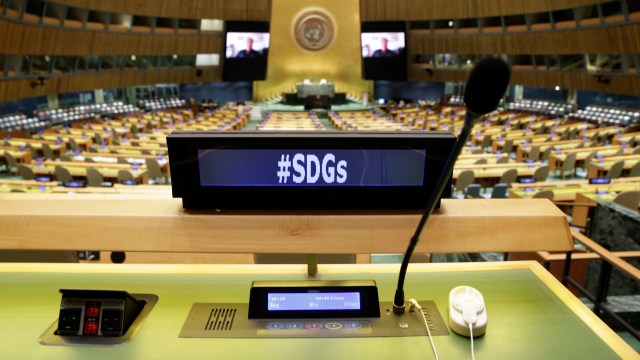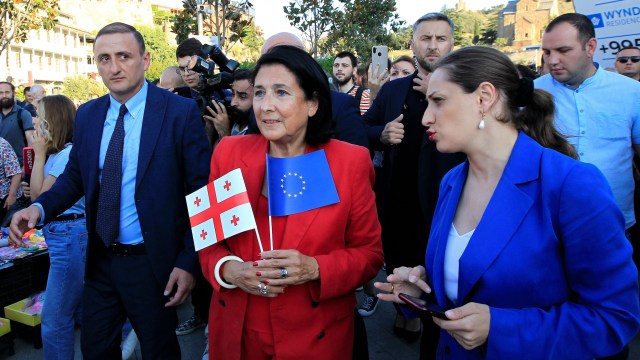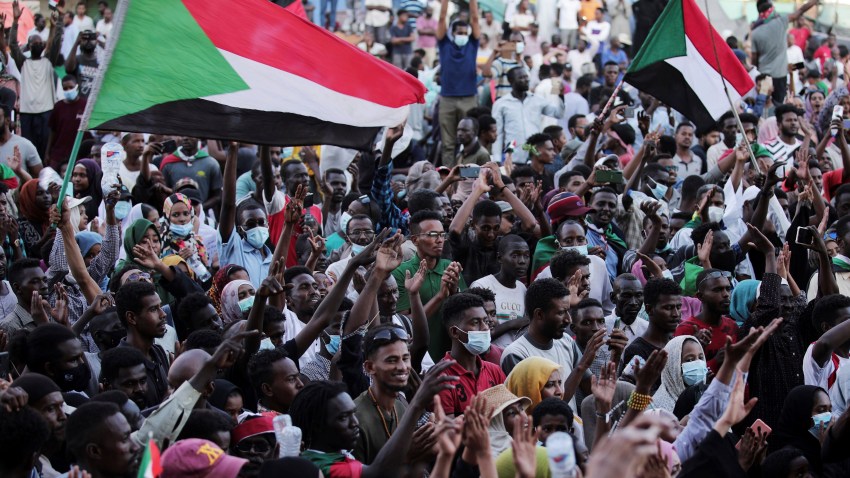Estimated reading time: 6 minutes
Today at WPR, we’re covering the Sustainable Development Goals and Georgia’s Europe-Russia dilemma.
But first, here’s our take on today’s top story:
Sudan: The U.N. special envoy for Sudan, Volker Perthes, resigned Wednesday in a final speech to the U.N. Security Council, warning that with neither side close to a decisive victory, the conflict between Sudan’s rival military leaders “could be morphing into a full-scale civil war.” (AP)
Our Take: Perthes had already been declared persona non grata by Sudan’s military government in early June, but his resignation is still significant, especially as it comes against the backdrop of other recent developments in the conflict.
First, Gen. Abdel Fattah Al-Burhan—the head of Sudan’s armed forces and the country’s de facto ruler—managed to extricate himself late last month from a military base in Khartoum, where he had remained under siege since fighting began in mid-April. He has since been engaged in a regional tour, seeking support from Egypt, Eritrea, South Sudan, Qatar and Turkey.
Burhan’s trip is clearly meant to counter the backing that the paramilitary Rapid Support Forces, or RSF—led by his rival, Mohamed Hamdan Dagalo, known as Hemedti—is receiving from Russia and the UAE. That highlights the extent to which the conflict has become not only internationalized, but also an extension and expression of regional rivalries, particularly among the Gulf states.
Second, the escalation of atrocities being committed against civilian populations has exacerbated an already severe humanitarian crisis. In the Darfur region, especially, there have been reports of brutal attacks on civilians, who have been targeted by the RSF and its allied Arab militias based on their ethnicities.
The conflict, evidently, is nowhere near to ending. But Perthes’ resignation is a particular blow to hopes that efforts by non-aligned international actors could lead to peace talks between the warring sides. Instead, most international involvement in the conflict is now linked to geopolitical rivalries, fueling the fighting, rather than seeking to stop it.
More context from WPR:
- Yasir Zaidan on what’s needed to sustainably end the conflict.
- Charli Carpenter on civilian self-protection during the fighting.
- Chris O. Ògúnmọ́dẹdé on the conflict’s regional implications.
- Volker Perthes and Wibke Hansen on why Sudan’s democratic transition depended on stability in Darfur. (From 2020)


It’s Not Too Late to Get the SDGs Back on Track. Here’s How
Next week, world leaders will convene at the 2023 SDG Summit in New York to mark the beginning of what is hoped will be a new phase of accelerated progress toward realizing the Sustainable Development Goals, adopted in 2015.
The outlook so far is discouraging. Recent cascading crises—including the COVID-19 pandemic and the war in Ukraine—threaten to reverse the progress made on several goals at both the local and global level. They have also exacerbated one of the most significant challenges to realizing the SDGs: financing gaps.
Isabella Massa and Samory Toure look at the three key areas that need to be addressed in order to close the SDG financing gaps.
Georgia Is Hedging Its Bets on the EU and Russia
Just after Russia launched its all-out invasion of Ukraine in February 2022, Georgia applied for membership in the EU, which responded with a list of a dozen reforms Tbilisi needs to implement before it can receive candidate status. Since then, the government has ostensibly been working to fulfill those demands.

But while it’s abundantly clear that the Georgian people want to join the EU, it’s becoming increasingly unclear whether the current government is genuinely interested in seeing Georgia join the bloc.
Columnist Frida Ghitis breaks down the complicated situation.

We want to hear your take on the issues we cover. We’ll select one person from those who answer the question below to receive a free month of WPR.
This week’s question: U.S. President Joe Biden has framed competition with China as part of a larger global battle between democracy and autocracy. Earlier this week, however, Biden visited Vietnam, a repressive dictatorship, to shore up regional support to counter China. Should the U.S. partner with non-democracies in its efforts to counter China?

At a congressional hearing in Mexico City yesterday, Mexican journalist Jose Jaime Maussan presented what he purported to be two ancient mummies of extraterrestrials. Maussan, however, made similar claims in 2017 in Peru, where the country’s prosecutor’s office found the “bodies” to be recently manufactured dolls.
But for the sake of argument, let us suspend disbelief. What if it is eventually confirmed that intelligent, extraterrestrial life forms have visited Earth and continue to do so? Columnist Paul Poast explored the potential ramifications for global politics of such a revelation last month:

We Need to Rewrite Our Scripts for an Alien Visit to Earth
Aug. 4, 2023 | The US government probably isn’t hiding extraterrestrial UFOs. But if it was, what would that mean for international politics? Read more.
A panel of global experts has urged governments to place a moratorium on efforts to geoengineer the planet’s climate, the Guardian reports.
Amid the worsening climate crisis, geoengineering projects—which entail the large-scale manipulation of Earth’s climate—are incredibly seductive propositions for policymakers, because they offer the promise of taking us back to the relatively safe climate conditions of the 1980s, while preserving four decades of economic growth.
But geoengineering is far from risk-free. As James G. Dyke wrote in June, “in attempting to hack the Earth’s climate, we may end up breaking it.”
Geoengineering Without Decarbonization Won’t Solve the Climate Crisis
June 13, 2023 | Carbon dioxide removal and solar geoengineering could help with climate change mitigation, but they come with great risk. Read more.

That’s all for today’s Daily Review. Coming up, we’re covering Armenia’s relations with Russia and Republican presidential candidates’ fixation on invading Mexico.
Have a great day,
Jakob Cansler
More From WPR
- Michael Pettis on China’s economic slowdown.
- Alexander Clarkson on far-right historical revisionism in Germany.
- Andrew Gawthorpe on U.S.-China competition and climate diplomacy.
- Charli Carpenter on the nuclear security debate.

